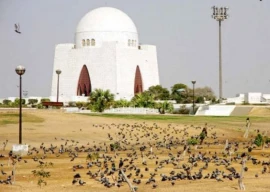
Organised by the Pakistan Institute of Labour, Education and Research (Piler), in collaboration with the Strengthening Participatory Organisation (SPO), the event had a large number of youth in attendance. The talks focused on the role the youth can play towards bringing peace to the region and countering religious disparity.
SPO’s youth trainer and facilitator, Zaheer Zarf, said that literature was the identifying component of every society. Citing the example of Russian novelist Maxim Gorky’s works, he stressed that it was literature that shaped a society’s ideology. “History tells us that when invaders attacked, they destroyed libraries and literature of the land,” he said. With regards to the literature being taught in the country today, he said that students should be taught about role models, such as Mother Teresa and Abdul Sattar Edhi, who offered something to humanity and not just invaders who captured Sindh.
Taking the point forward, Democratic Student Federation’s Karachi chapter president Naghma Sheikh said that it was the presence of hate language in the syllabi that was the root of the growing conflict. She urged the audience to acquire political awareness as it was the need of the hour for every citizen of Pakistan. “The concept of tolerance can only start from the confines of our homes and families,” she said, urging the audience to stand up for their rights and speak out against the state’s treatment of its people as mere beggars.
Mir Askari of the National Students Federation (NSF) spoke about the absence of student unions in educational campuses and how they served as important tools in fostering tolerance before they were banned in Ziaul Haq’s regime. “Unions enforce tolerance based on ideas and discussions,” he said, adding that differences that arise in their political discourse are a result of differences in opinion and not status.
Nauman Qadri of the Citizens for Democracy said that peace and collectivism among people could be mobilised through effective youth networking. Zeenia Shaukat from Piler said that people generally prefer disengagement from issues that cost them time and resources. Pointing towards the youth, she said that the state has always viewed them as a threat that had to be managed in a particular way. “If the 100 million youth take up the route of engaging the state, raise their voice against the status quo and concentrate on building their capacity, we have every reason to look forward to a bright future,” she said.
Published in The Express Tribune, January 16th, 2015.
COMMENTS (1)
Comments are moderated and generally will be posted if they are on-topic and not abusive.
For more information, please see our Comments FAQ
1731570357-0/elon-musk-(1)1731570357-0-405x300.webp)
-(1)1717678110-0/Kendrick-(1)-(1)1717678110-0-165x106.webp)






1732428532-0/BeFunk_§_]__-(43)1732428532-0.jpg)








No credibility. Just rhetoric and patgetic .